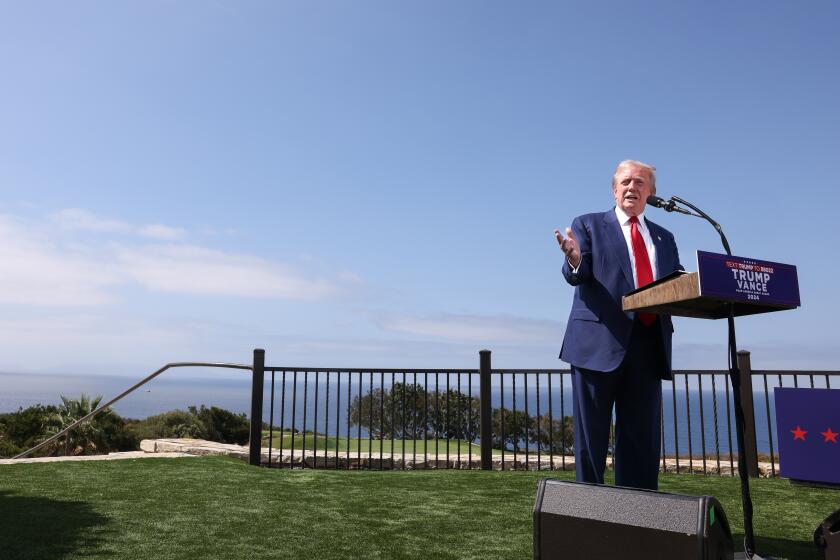GOP could have its unifier
John McCain now has a pathway to the Republican presidential nomination. The question is whether he can put his fractured party back together.
The Arizona senator, long the bane of the GOP establishment, showed in Florida that he could begin cobbling together a new Republican coalition -- attracting enough support from all corners of the party base to give him a plurality in the biggest and most diverse state to vote so far in the 2008 campaign.
He took about a quarter of conservatives, secured nearly a third of evangelicals, dominated among his typical base of self-described moderates, and won easily among voters who care about authenticity, experience and electability.
In winning Florida, McCain threw off a major critique of his candidacy: He prevailed in an all-Republican primary that excluded the more moderate independents who had ensured McCain’s wins in New Hampshire and South Carolina.
And in a state plagued by insurance woes, falling home prices and a rising number of foreclosures, he defeated a rival, former Massachusetts Gov. Mitt Romney, who had portrayed himself as the best-equipped to fix the economy.
Still, exit polls and voter interviews here showed that McCain had far to go before he could claim the party mantle.
He won about 1 in 5 voters who called themselves “very conservative.” An even smaller share of GOP voters said McCain “shares my values.” He benefited from former Arkansas Gov. Mike Huckabee, whose presence on the ballot drew support from many conservatives in the Orlando, Tampa Bay and Jacksonville areas that Romney needed to win.
McCain, a moderate on immigration issues, dominated among Cuban Americans and other Latino voters who make up a far greater share of the Republican electorate than in other states.
Tuesday’s results set up a dramatic face-off over the next six days as McCain and Romney compete in more than 20 states. Each man aims to prove that only he can build the elusive GOP coalition.
“The race seems to have settled in now,” said Florida Republican Gov. Charlie Crist, whose 11th-hour endorsement of McCain helped give him credibility with some in the state’s GOP base. “It is clear that it seems to be a two-man race.”
McCain and Romney have sharply contrasting styles and records, but neither has won the adoration of the party’s core conservative voters.
Although Romney won in a number of Florida’s most conservative counties, his margins were not as large as his strategists had hoped.
And McCain seemed to cut his losses, perhaps with support from key conservative players such as gun rights activist Bill Bunting, the GOP chairman in Pasco County, the fast-growing area north of Tampa.
Crist, who as a state lawmaker earned the respect of many Florida conservatives for sponsoring tough anti-crime measures such as the adoption of prisoner chain gains, suggested in an interview that his popularity on that front might have rubbed off on the Arizona senator.
“Maybe Chain Gang Charlie helped him out a little bit,” he said.
The biggest surprise in Tuesday’s vote may have been McCain’s ability to close the gap on economic issues.
Romney spent millions of dollars on television ads promoting himself as an economic leader who had built a successful business, and in speeches he chided McCain for his recent remark that economics is “not something I’ve understood as well as I should.”
Romney seemed to think that his reputation as a competent business executive would carry him to victory.
He described himself Tuesday as “someone who is proud to say the economy is in his DNA.”
McCain spent most of his time and money accentuating his national security record, which helped him win key counties in the conservative, military-friendly Panhandle. But he also began taking strides to repair his image on the economy.
McCain talked about his experience as chairman of the Senate Commerce Committee, and he aligned himself closely with Crist, who has championed a property-tax-relief program to fix the state’s problems.
McCain even bragged to a television interviewer that he was reading a bible of free-market economics, Adam Smith’s “The Wealth of Nations.”
Apparently it worked.
Exit polls conducted for media organizations showed that nearly half of Florida Republican voters ranked the economy as the most pressing issue -- and McCain beat Romney in that group.
That bodes well for McCain as the race moves to states such as California, which, like Florida, is a hotbed in the country’s real estate meltdown.
Most impressive for McCain was his strength in the way voters perceived him as a person. He was picked overwhelmingly as the candidate who says what he believes. A vast majority also thinks McCain is the most likely candidate to beat a Democrat in November.
Next week, McCain, long the GOP maverick, must show that he can leverage those strengths and rebuild a Republican coalition that has struggled through a fractious primary season.
If he can continue to cut his losses among core conservatives, build on his popularity among moderates, leverage his natural strengths on national security and war, and even win over some of his party’s skeptical economic conservatives, this maverick will stand a realistic chance to become the embodiment of his party’s establishment -- its nominee for president. peter.wallsten@latimes.com
Times staff writers Ben DuBose and Sarah D. Wire in Washington contributed to this report.
More to Read
Get the L.A. Times Politics newsletter
Deeply reported insights into legislation, politics and policy from Sacramento, Washington and beyond. In your inbox three times per week.
You may occasionally receive promotional content from the Los Angeles Times.










